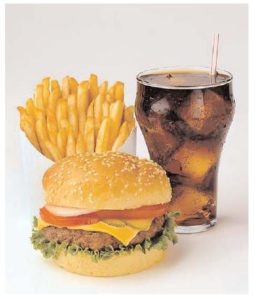 Americans are eating so much ultra-processed food that it's now more than 50% of their daily calories. And why shouldn't they eat these foods? They're easy to get (fast foods, prepackaged foods, take out foods), they taste good, and they're great for people pressed for time. That's why they're called "convenience foods" and include fast foods, prepackaged foods, many frozen meals, take out foods, soda, packaged snacks, and many cakes, candies, and cookies.
Americans are eating so much ultra-processed food that it's now more than 50% of their daily calories. And why shouldn't they eat these foods? They're easy to get (fast foods, prepackaged foods, take out foods), they taste good, and they're great for people pressed for time. That's why they're called "convenience foods" and include fast foods, prepackaged foods, many frozen meals, take out foods, soda, packaged snacks, and many cakes, candies, and cookies.
But... there's a dark side to highly processed food. It is linked to all sorts of harmful health effects (cancer, Alzheimer's disease, etc), to chronic inflammation, and now to worse heart health. Even our beneficial gut microbes don't like highly processed foods. Instead, they like real whole foods, especially plant based foods high in fiber, such as whole grains, fruits, vegetables, nuts, seeds, legumes.
There are all sorts of ingredients in ultra-processed foods that are laboratory concoctions, from artificial and natural flavors, colors, additives, preservatives, etc. Read the ingredient lists!
The results of a new study by researchers at the CDC (Centers for Disease Control and Prevention) found that for every 5% increase in calories from ultra-processed foods a person ate, there was a corresponding decrease in overall cardiovascular (heart) health.
From Science Daily: Too much ultra-processed food linked to lower heart health
Ultra-processed foods, which account for more than half of an average American's daily calories, are linked to lower measures of cardiovascular health, according to preliminary research to be presented at the American Heart Association's Scientific Sessions 2019 -- November 16-18 in Philadelphia.
Researchers at the U.S. Centers for Disease Control and Prevention (CDC) found that for every 5% increase in calories from ultra-processed foods a person ate, there was a corresponding decrease in overall cardiovascular health. Adults who ate approximately 70% of their calories from ultra-processed foods were half as likely to have "ideal" cardiovascular health, as defined by the American Heart Associations' Life's Simple 7®, compared with people who ate 40% or less of their calories from ultra-processed foods.
Foods were categorized into groups by the extent and purpose of industrial processing they undergo. Ultra-processed foods are made entirely or mostly from substances extracted from foods, such as fats, starches, hydrogenated fats, added sugar, modified starch and other compounds and include cosmetic additives such as artificial flavors, colors or emulsifiers. Examples include soft drinks, packaged salty snacks, cookies, cakes, processed meats, chicken nuggets, powdered and packaged instant soups and many items often marketed as "convenience foods."
"Healthy diets play an important role in maintaining a healthy heart and blood vessels," said Zefeng Zhang, M.D., Ph.D., an epidemiologist at the CDC. "Eating ultra-processed foods often displaces healthier foods that are rich in nutrients, like fruit, vegetables, whole grains and lean protein, which are strongly linked to good heart health. In addition, ultra-processed foods are often high in salt, added sugars, saturated fat and other substances associated with increasing the risk of heart disease."
Using data from the National Health and Nutrition Examination Survey (NHANES) collected between 2011 and 2016, researchers at the CDC reviewed the results from 13,446 adults, 20 years of age and older, who completed a 24-hour dietary recall and answered questions about their cardiovascular health.
Cardiovascular health is defined by the American Heart Association's Life's Simple 7 as measures of healthy blood pressure, cholesterol and blood glucose levels, avoidance of tobacco products, good nutrition, healthy body weight and adequate physical activity.
